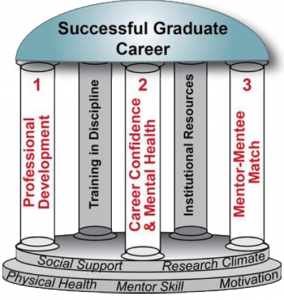Projects
Graduate Education Research
Science of Science Policy Approach to Analyzing and Innovating the Biomedical Research Enterprise (SCISIPBIO) Ongoing Research:
Overview: Traditional PhD programs in the biomedical sciences have been geared toward a primary goal: to train the next generation of academic researchers. We evaluate the outcomes of substantially broader training that supports student development holistically as scientists, professionals, and individuals across three areas: professional development, mental wellness, and mentorship.
Purpose: Data will be gathered to support three aims which support the overall research question:
“What aspects of the trainee environment lead to graduate student success, and ultimately support the development of the biomedical workforce?”
We will evaluate three specific aspects of the training environment:
- Determine the impact of professional development training on student success and career outcomes.
- Measure the impact of professional development participation and engagement on trainee mental health.
- Determine the impact of mentor-mentee match on scientific leadership career outcomes.
Collectively, this evidence-based evaluation will be critical as institutions decide how to focus limited resources to improve the training environment and effectively train the biomedical workforce and future scientific leaders.
NIH Broadening Experiences in Scientific Training (BEST) Ongoing Research:
The employment landscape for PhD-trained scientists has changed drastically over the past 40 years. Clearly, we must respond to these needs by developing new and innovative training programs that address the professional development requirements of graduate students and postdoctoral fellows.
“The purpose of the Immersion Program to Advance Career Training (ImPACT) is to provide trainees in the biomedical sciences with the knowledge and skills that they need to make informed career decisions and successfully navigate the path toward the career of their choice.”
To achieve this goal, we have developed a new training curriculum that consists of focus areas that support skills training for the full spectrum of careers both outside and inside academia. We have collaborated with internal and external partners to develop the training components for each focus areas to create Career Cohorts of trainees with similar career interests which support students in like-minded career interest groups to administer program components such as career exploration activities, networking, career preparation/planning (IDPs), and job search support. This structure allows us to make this program available to all biomedical graduate students and postdoctoral fellows at UNC. Our specific aims are the following:
- Develop a comprehensive career awareness and professional skills training program for graduate students and postdoctoral fellows in the life sciences.
- Maintain and support a positive institutional environment in which training faculty have sufficient resources to advise students on the full range of career paths.
- Measure the effectiveness of the program over time by careful tracking of participants and non-participants in terms of objective, clearly defined metrics.

